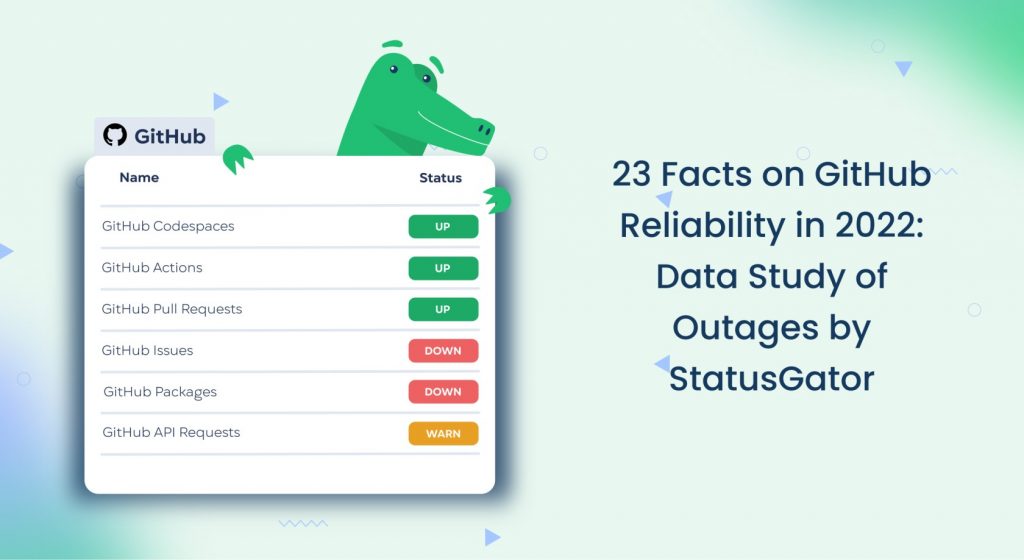
With over 83 million users, GitHub is one of the most popular development tools out there and the third most monitored service on StatusGator.
Since so many users depend on GitHub, we wanted to analyze GitHub’s reliability in 2022 and find and uncover some interesting facts about GitHub outages.
The data behind this article
For our analysis of GitHub’s reliability, we used historical outage data for GitHub. The data comes from our own product, StatusGator, which aggregates data from official status pages to create team status pages.
GitHub’s status page identifies two severity levels for each downtime event. These are degraded performance (marked in yellow) and degraded availability (marked in red). For clarity, this article refers to degraded performance events as minor incidents and degraded availability events as major outages.

GitHub’s Major Outages 2022 Stats
To learn more about GitHub outages in 2022, we split them by month. Here is what we found:
1. How many major outages did GitHub have in 2022?
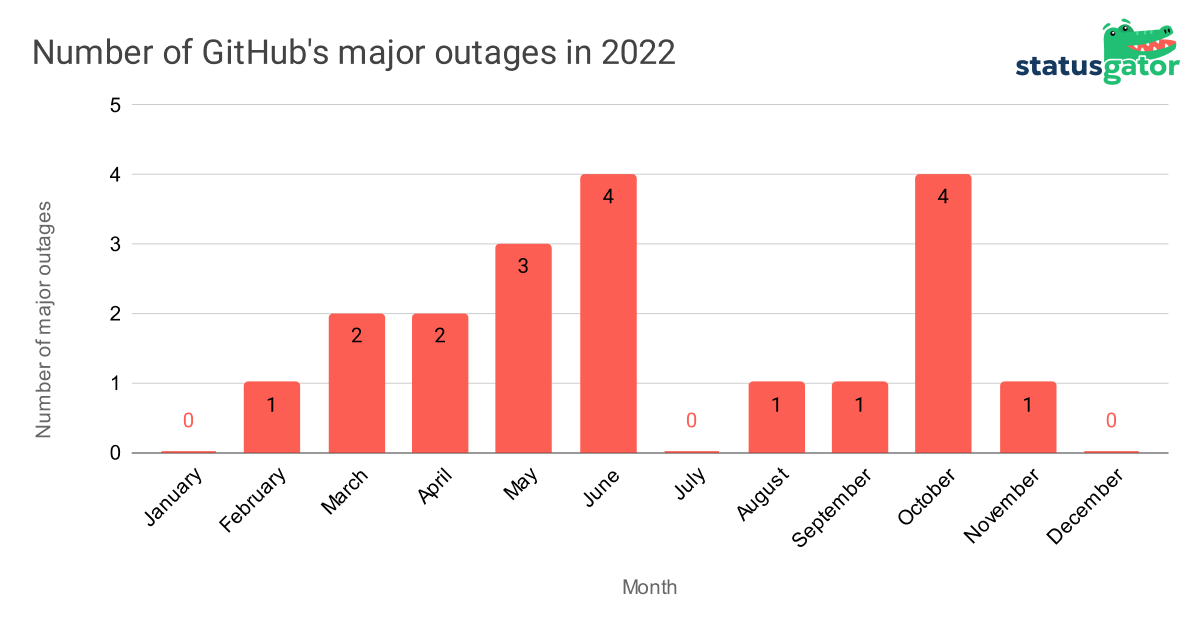
Overall, GitHub had 19 major outages in 2022. Of these outages, 12 happened in the first half of the year.
2. What month did the most outages occur in?
June and October saw the most outages – 4 events each.
3. What month did the least outages occur in?
No outages were observed in January, July, and December.
4. How long did the major outages last?
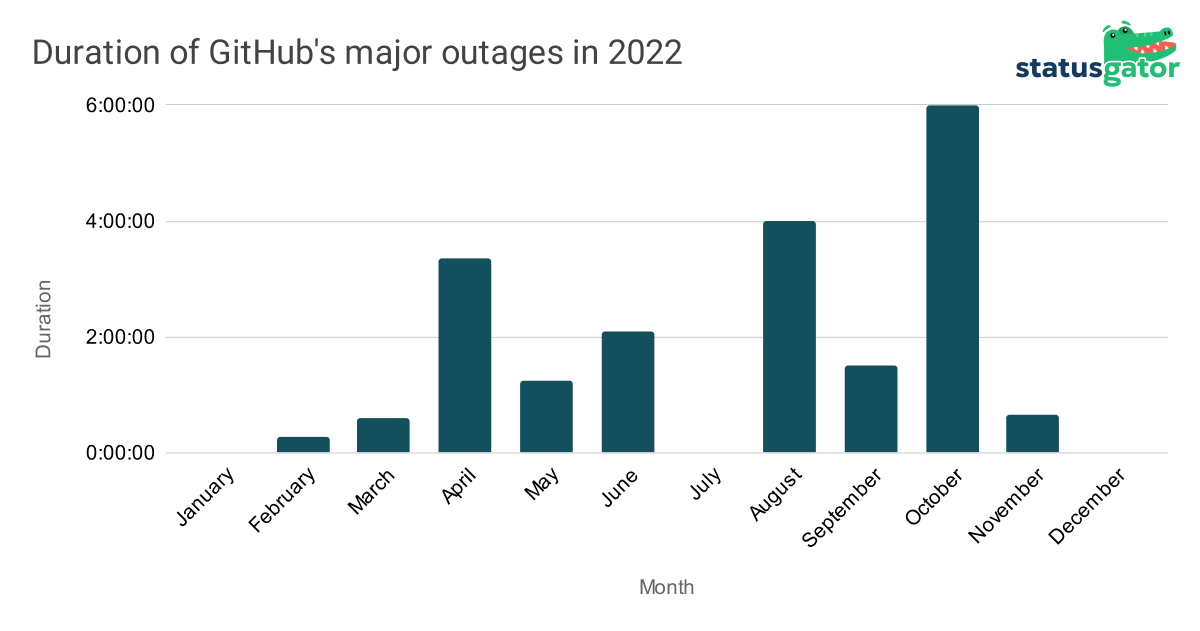
Overall, the total outage duration throughout 2022 was recorded at 19 hours and 43 minutes.
5. When did the longest outages occur?
October and August had the longest outages. Total outage durations were 6 hours and 4 hours, respectively.
6. When did outages occur most often?
January-May had more outages than July-December, but the outage duration was higher in the second half of the year.
7. How many GitHub features were unavailable during the major outages?
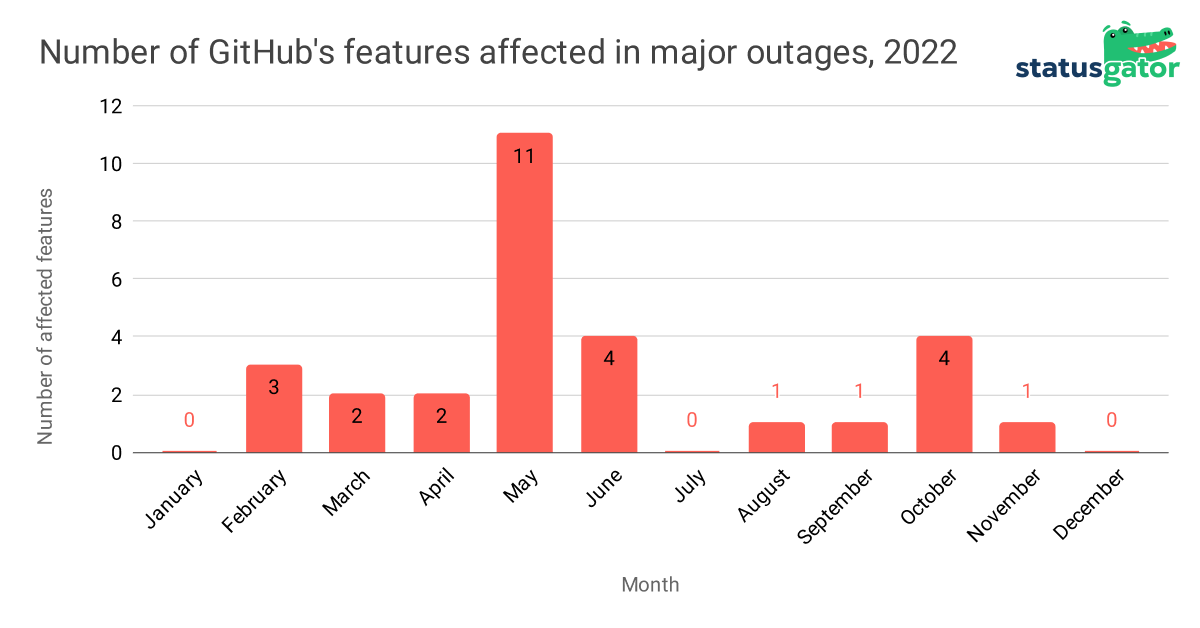
In total 29 GitHub features were affected during the major outages in 2022.
8. What month were the most GitHub features affected by outages?
The highest number of GitHub features affected was observed in May – 11 instances in total.
Two other months of interest would be June and October – with 4 features affected in each month.
9. What were the top 5 longest GitHub outages?
The graph below shows 5 major outages, as well as details surrounding them.
| 5 Major GitHub Outages | |||
|---|---|---|---|
| Date | Duration | Features affected | Message |
| August 29, 2022 | 4 hours | Codespaces | Degraded performance |
| October 12, 2022 | 2 hours 55 minutes | Codespaces | Degraded availability |
| April 1, 2022 | 2 hours 37 minutes | Codespaces | Degraded availability |
| October 26, 2022 | 1 hour 50 minutes | Codespaces and Issues | Degraded availability |
| April 25, 2022 | 45 minutes | GitHub Packages | Degraded availability |
10. What GitHub feature was affected the most by the major outages?
The longest outages were observed in the Codespaces feature.
11. What was the longest GitHub outage in 2022?
The most prolonged single outage was in August – 4 hours. Only Codespaces was affected.
12. What outages affected the biggest number of GitHub features?
| GitHub's major outages that affected the most features | ||||
|---|---|---|---|---|
| Date | Duration | Features affected | Message | Comment |
| May 27, 2022 | 15-20 minutes | All the features, except Copilot | Degraded availability | All the GitHub features, except Copilot, went down for 15 minutes, but API Request that was available 5 minutes later than the other features. |
| Feb 2, 2022 | 6-16 minutes | GitHub Actions, Issues, Pull Requests | Degraded availability | GitHub Actions were back up after 6 minutes of outage, while Issues and Pull Requests went back up 10 minutes later. |
The most significant major outage was observed on May 27, 2022. All GitHub features except for Copilot went down – some for 15 minutes and others for 20.
13. How many GitHub features were typically affected in major outages in 2022?
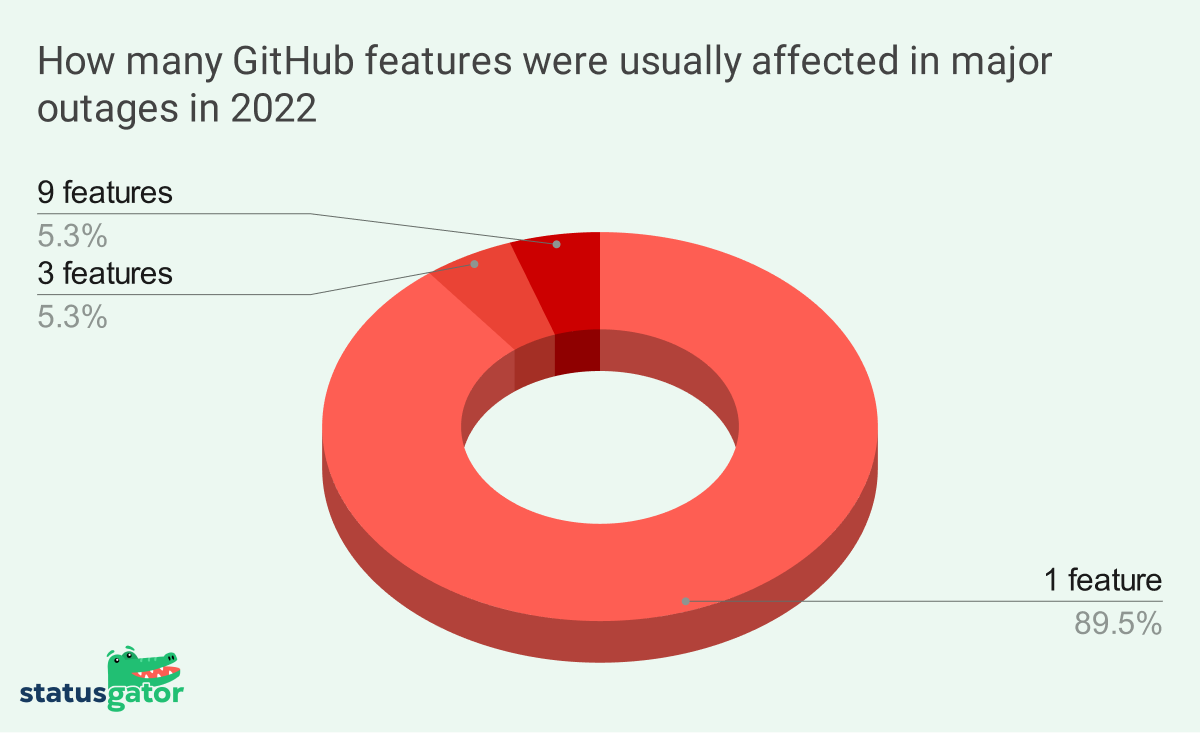
The most major outages (89.1%) affected only one feature at a time.
14. What were the least reliable GitHub features in 2022?
| Outages across GitHub's features | ||
|---|---|---|
| Feature | Number of outages | Total duration |
| Codespaces | 7 | 13:37:00 |
| Actions | 7 | 2:41:00 |
| Packages | 4 | 2:10:00 |
| Issues | 3 | 1:11:00 |
| Pull Requests | 2 | 0:31:00 |
| API Requests | 1 | 0:45:00 |
| Copilot | 1 | 0:25:00 |
| Pages | 1 | 0:15:00 |
| Git Operations | 1 | 0:15:00 |
| Webhooks | 1 | 0:05:00 |
Codespaces and Actions features were the least reliable in 2022 – both experienced 7 major outages.
Codespaces was down for 13 hours and 37 minutes accounting for a 62.1% share of the total outage duration.
To look further, we highly suggest you look at which GitHub features are the most reliable in 2022. Especially if you plan to use GitHub in the future!
15. How many incidents did GitHub have in 2022?
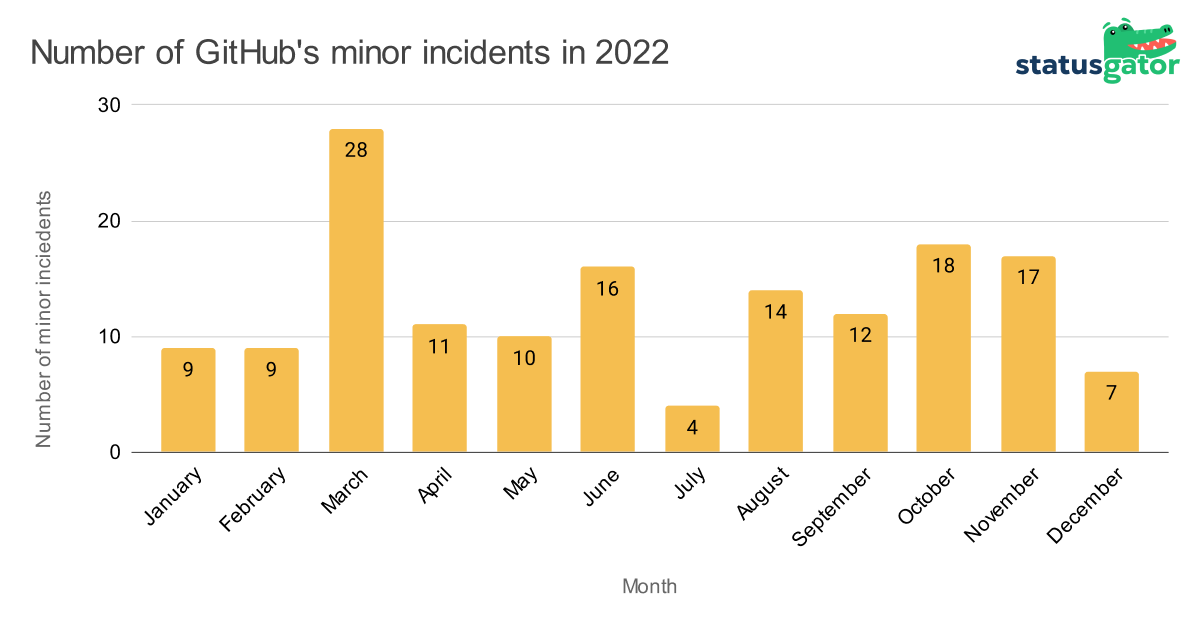
GitHub had a total of 155 minor incidents in 2022.
16. What month did the most GitHub incidents occur in?
The month with the highest number of minor incidents was March, with 28 total.
17. What month did the least GitHub incidents occur in?
The smallest number of minor incidents involved was in July 4 incidents.
18. How long did the minor incidents last?
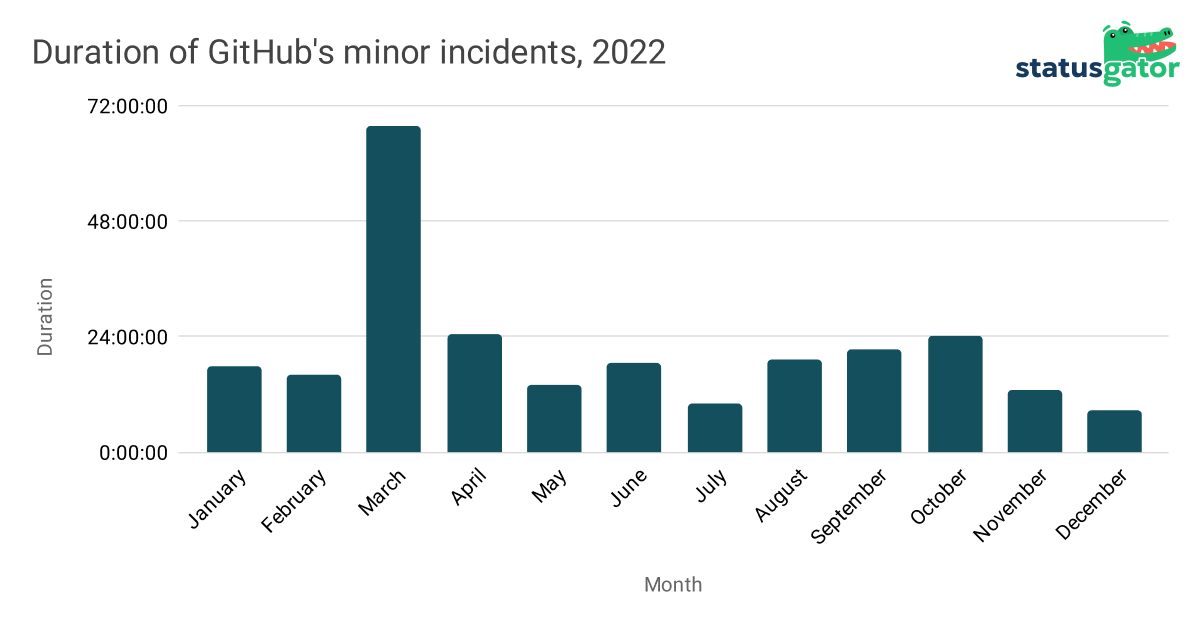
From the chart above we can see that the total duration of GitHub’s minor incidents in 2022 was 252 hours and 42 minutes.
19. When did the longest incident occur?
March has the highest total duration for minor incidents at 67 hours and 40 minutes.
20. When did the shortest incidents occur?
The shortest total duration of minor incidents was in December at 8 hours and 25 minutes.
21. How many GitHub features were affected during the minor outages?
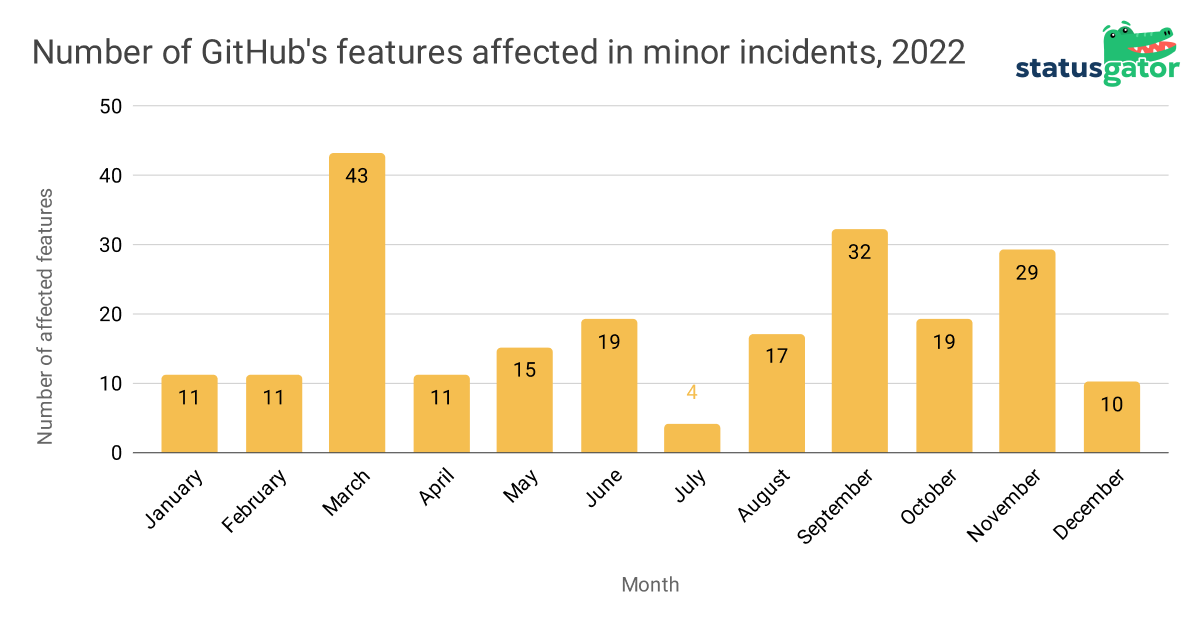
In total, 221 cases of GitHub features being affected by minor incidents were observed in 2022.
22. When were the GitHub features affected by minor incidents most often?
The highest number of features affected was in March – 43 cases. Other significant spikes were seen in September (32 cases) and November (29 cases).
23. When were the GitHub features affected by minor incidents least often?
July had the lowest number of features affected – only 4.

Conclusion
In this article, we presented 23 facts on GitHub reliability in 2022.
Our data was unique, and we found some useful facts. However, we must admit that GitHub is reliable.
This is because all features rarely go down at the same time, and since it is such a commonly used service, this is beneficial for GitHub’s reliability.
We do, however, see two points that require improvement:
- Codespaces is obviously less reliable than the other features. If this could be improved, GitHub outage and incident data could be seen to improve.
- The communication for outages and incidents doesn’t contain any information about the reasons why they happened. We’re not saying GitHub isn’t transparent, but it would be hugely beneficial if this was improved in the future.
To view in-depth data on cloud service reliability, try StatusGator for free.



